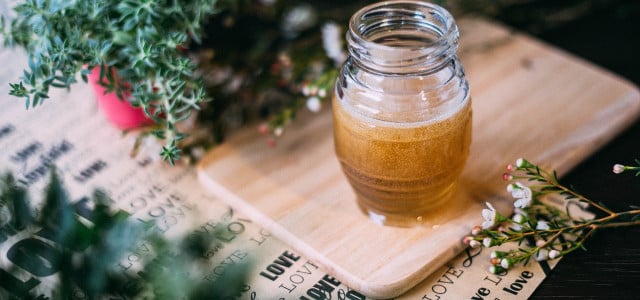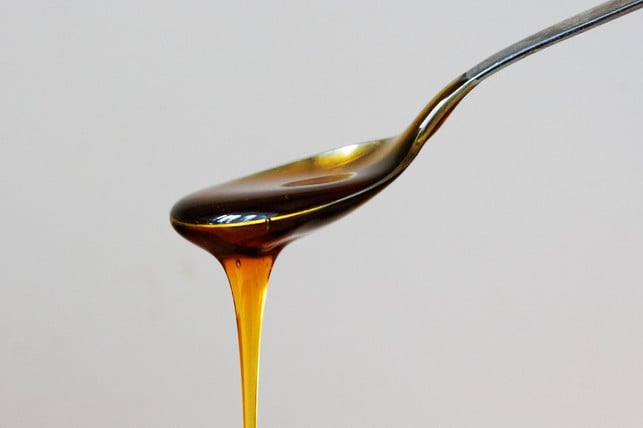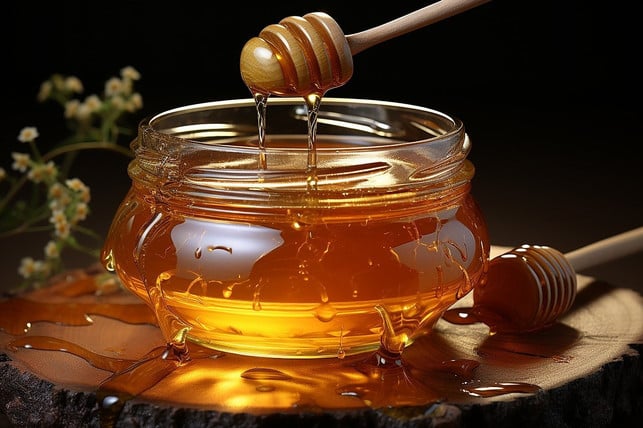
Fennel honey is considered a proven home remedy for colds and gastrointestinal problems. But what effect does it actually have? Here you can find out how you can use fennel honey and prepare it yourself.
Fennel honey is a traditional home remedy and consists of a mixture of fennel syrup and honey. Fennel oil is sometimes added to honey. The home remedy plays a particularly important role in pediatric naturopathy, as even small children as young as one year old can take it. Fennel honey is used to relieve colds and problems in the gastrointestinal tract.
The natural remedy is said to have an effect that is largely based on tradition and experience. However, there is some scientific evidence that both honey and fennel have health-promoting effects in themselves.
Depending on the type of honey, the composition of the healing ingredients differs significantly – and thus also their medical effectiveness. New Zealand Manuka honey, for example, is said to have antibacterial and anti-inflammatory effects that exceed those of other varieties.
Effects of honey and fennel

(Photo: CC0 / Pixabay / StockSnap)
Fennel honey consists of two components. Fennel and honey. Both products have their individual health benefits.
The effect of honey
-
For a sore throat: According to general medical opinion, honey does not combat the causes of a sore throat, according to the Pharmacy Review. However, honey has a beneficial effect on irritated mucous membranes and makes a dry throat feel a little more pleasant, at least for a short time.
-
For coughs: The effects of honey for coughs have been relatively well researched. In particular, honey is said to have a mild cough-relieving effect on children. A review study has shown that honey can help children with acute coughs: Honey ensures that cough attacks are less severe and stressful. They are also said to occur less frequently and the cough goes away more quickly. Studies have also shown that children can sleep better when their cough is stopped with honey.
-
For stomach pain: According to Netdoktor, honey contains substances that build up the stomach lining. It can help with stomach pain caused by damaged or inflamed stomach lining.
Warning: Honey is not suitable for babies under twelve months as they may be sensitive to certain bacteria in honey. From the age of one year, honey is safe for children in normal consumption quantities.
The effect of fennel
-
For colds: According to Pharmacy Umschau, essential fennel oil promotes healing for cold symptoms such as coughs and runny nose. The substances trans-anethole and fenchone it contains are said to help loosen stuck mucus from the bronchi. At the same time, they promote the removal of mucus from the respiratory tract.
-
For gastrointestinal complaints: Fennel oil is also said to have a digestive and antispasmodic effect. That’s why fennel tea helps against flatulence and a feeling of fullness.
The effect of fennel honey: Not a miracle cure
Fennel honey combines the healing properties of two proven home remedies. It therefore makes sense to assume that fennel honey can be particularly effective against certain ailments.
There is no doubt that honey itself is a natural home remedy that relieves cold symptoms and is also good for children. If essential fennel oil or fennel seeds are added to the honey, it contains additional healing-promoting ingredients.
Nevertheless, fennel honey is not a miracle cure: it will not ensure that all symptoms disappear within a very short period of time.
Use and dosage of fennel honey

(Photo: CC0 / Pixabay / Free Photos)
When taking fennel honey you should know the following:
Dosage and side effects
If you want to give your child fennel honey, it is advisable to use medicinal fennel honey from the pharmacy. It has a child-friendly concentration of fennel oil.
When dosing the fennel honey, follow the instructions on the package leaflet. The recommendation is usually two to three measuring spoons, which are taken throughout the day. If you make your own fennel honey (see below), three teaspoons a day are also recommended. In very rare cases, an overdose can cause flatulence or diarrhea as side effects.
Method of application
Let the honey or syrup melt in your mouth for as long as possible and swallow it slowly and in portions. This is how it works best, especially for sore throats. Take the last spoonful right before you go to bed so that the effects can develop overnight. This is particularly helpful in relieving nighttime cough attacks.
Fennel honey and allergies
Some caution is advised if you are allergic to mugwort and birch pollen and this is accompanied by a celery allergy. Then you may have an allergic reaction to other umbelliferous plants, including fennel. If you are sensitive to composite plants such as arnica and chamomile, in rare exceptions a cross allergy can occur. You should not take fennel honey.
Important: Pregnant women should discuss taking fennel honey with their gynecologist beforehand.
Buying fennel honey: This is what you should keep in mind

(Photo: CC0 / Pixabay / Schwoaze)
The term “fennel honey” refers to two different products. You should know the differences between the products if you want to buy fennel honey:
-
Fennel honey as a preparation of honey and fennel syrup and/or fennel oil: Medicinal fennel honey is available commercially with varying doses of fennel syrup and/or fennel oil. Especially if you want to give it to children, you should make sure that you buy a medicinal fennel honey with a child-friendly dosage.
- When buying fennel honey, make sure that it actually contains honey and not sugar syrup instead.
-
Fennel honey as pure honey: This is a very rare type of honey. To do this, bees fly to the fennel fields where sweet fennel seeds are harvested. But there aren’t nearly enough such fields for bees to collect enough nectar from fennel plants alone. You will rarely find this pure honey in (organic) supermarkets. In addition, it serves more as a special taste experience than for medical use.
Recipe: This is how you make fennel honey yourself

(Photo: CC0 / Pixabay / nicolagiordano)
If you want to use fennel honey for yourself or older children, you can simply make it yourself. This has the advantage that you can choose honey that is as sustainable and natural as possible:
- Sustainable honey comes from the region and is not a product imported from South America, whose transport causes climate-damaging CO2 emissions.
- You should also choose organic honey. In principle, the risk of conventional products containing pesticide residues is greater. Organic beekeepers also meet stricter requirements when it comes to the conditions in which bees are kept.
For one glass of fennel honey you need:
- 30 g fennel seeds (available in pharmacies, health food stores and organic markets)
- Mortar, rolling pin or bottle
- 200 g liquid honey (preferably cold-spun and regional honey from organic beekeeping)
- 1 sterile screw-top jar
This is how you prepare the fennel honey:
- Crush the fennel seeds with a mortar so that the essential oils come out. Alternatively, you can crush the seeds in another way. For example, roll over it with a rolling pin or a glass bottle.
- Put the fennel seeds in the screw-top jar and pour the honey over them.
- The honey-fennel mixture should steep for three to ten days so that the fennel essential oils can be transferred to the honey.
- You can then filter the honey through a fine sieve to remove the seeds. To do this, however, you need a very fine nylon sieve, like the one beekeepers use. If you don’t have such a sieve, you can simply leave the seeds in the honey. The finer you crush the seeds, the less you will notice them.
Homemade fennel honey can be stored in a cool, dark place for several months to a year.
Read more on Techzle\.com:
- Vegan honey: The 6 best alternatives to bee honey
- Good for colds: make your own ginger tea
- Gastrointestinal: home remedies for the symptoms
Revised by Philipp Multhaupt
** marked with ** or orange underlined Links to sources of supply are partly partner links: If you buy here, you are actively supporting Techzle\.com, because we then receive a small part of the sales proceeds. More info.